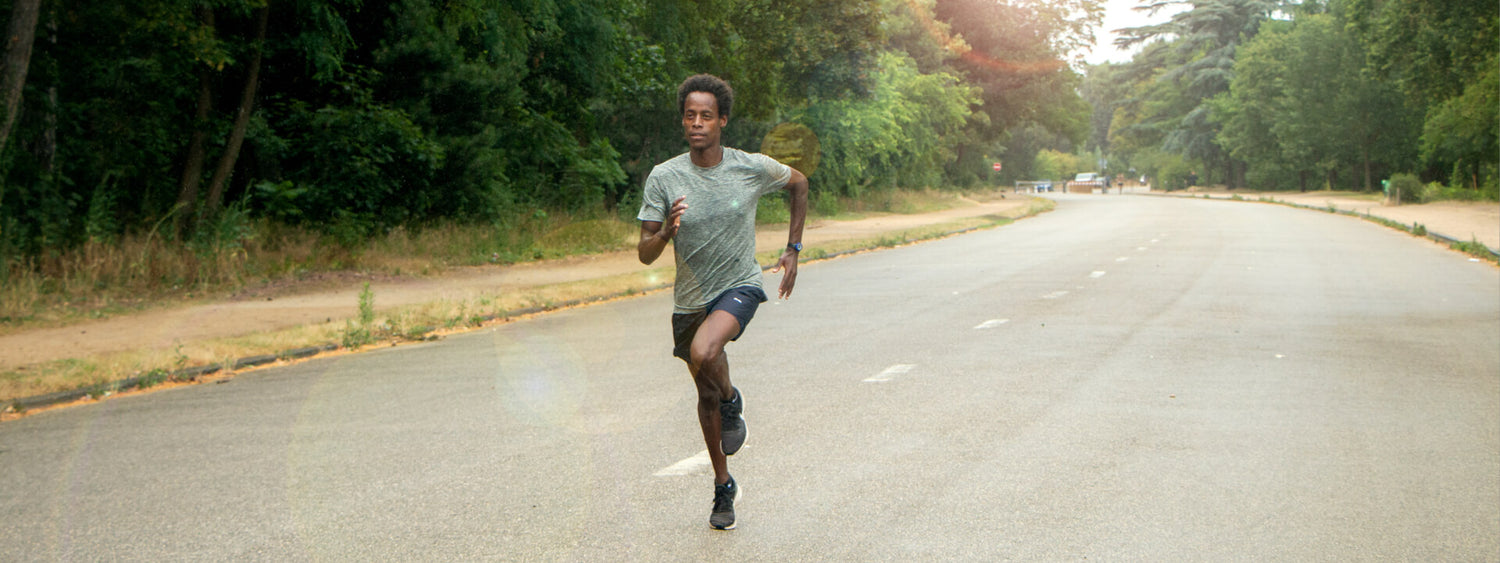Interview with Yosi Goasdoué, French half-marathon champion.
Today we are talking to you about an aspect of an athlete's life which is sometimes wrongly overlooked: recovery.
Yosi shares with us his vision of the importance of rest but also of other facets of pre and post-workout recovery, to optimize your progress in your discipline.

Hello Yosi, how are the competition preparations going for the second part of 2021?
The preparations are going rather well, with the help of the spring weather! The current situation allows us to do a lot of mileage.
We are also taking advantage of the situation to optimize our physical preparation in order to be at the top by June. Afterwards we can start to consider more specific sessions for the autumn races.
We are often tempted to say that the result of a sporting practice comes mainly through the exercise of it; the nutrition part and its importance are also starting to have more and more resonance among amateur practitioners... but we still live in an era which carries a discourse which celebrates the relentlessness to achieve sporting success (or other for that matter). ), to the point of injury, even exhaustion, as if success lay behind the line of well-being. The idea of “suffering to be beautiful”, a little.
What do you think of this speech? Do you think it is essential to progress?
I was lulled during my American university years by the motto “ no pain no gain » which is legion there…
It has certain advantages: that of self-sacrifice, of perseverance, of going beyond these limits. I think this is a relevant approach for a high-level athlete, but it should not apply systematically to amateur athletes who simply fuel their passion.
I think first of all that listening to your body, then balancing professional life, personal life and sporting life are essential to make the best progress. The challenge is above all to feel good in your head and to move forward with your practice with pleasure.
As soon as we lose this focus, the risk of fatigue, and therefore injury, is greater.

How could we further highlight the importance of well-being and, therefore, recovery with a sports session?
By constantly repeating to yourself that recovery is an integral part of training! I'll take an example that everyone knows: your stretching session after your run. This is an essential step in your recovery!
Are there “essentials” for recovery, which are found in all sporting disciplines (stretching, time left before nutrition with training, etc.)?
Stretching is essential in all sporting disciplines. It helps relax the muscles after intense effort. Stretching makes the body “breathe”, in a way.
Sleep is also an integral part of recovery for the regeneration of the body. Finally, we know it better in our time, in fact, a healthy and balanced diet is essential, and I am counting hydration here: 1.5 L minimum per day.

What aspects of recovery are specific to running that you practice professionally?
Personally, I regularly wear compression stockings to drain my legs as best as possible. I also regularly practice cryotherapy to recover from accumulated fatigue.
Can we recover “too much”? Is there a virtuous cycle to find and maintain (of time, intensity, etc.) between recovery, physical exercise, etc.?
Certain recovery practices can be counterproductive if practiced excessively, such as saunas and hammams. They can soften muscles. For this type of recovery to be effective, you must take it away from your more intense physical activity for at least 24 hours.
Would you say that to progress you need to train for your sport as much as “train to recover well”?
To progress: regularity. This is the key to your entire practice, so that the body gets used to the intensity you put it through.
And, yes, you have to combine physical activity with recovery from the start: if you train more, you recover more. The two go hand in hand. If you need to see it that way, you can even integrate your “recovery sessions” into your schedule, just like your training sessions.
.jpg)
We know the importance of the mind in the exercise of a discipline. What is the place of the mind, what is its role, in the recovery stage? What should we “say” to ourselves to recover well?
For the mind there are things to say to yourself, but also things to definitely not say to yourself!
We need to get rid of the fact that “not running”, or “not doing sport” makes us regress. Recovery is simply part of your progress!
Do you still need to move? Do stretches, go for a walk… Choose gentle practices.
Do you have some simple recovery steps to share with any beginner to make their first sporting experience successful? Any advice that would structure your practice solidly from the start with regard to recovery?
The best way is to start with a simple little rule: time your practice over the weeks.
Write down your time of kilometers traveled, your time of minute of stretching, your muscle strengthening time achieved, your sleeping time in addition... By doing this you don't lose sight of anything, and you can then track the elements of your sports practice which can be improved.
